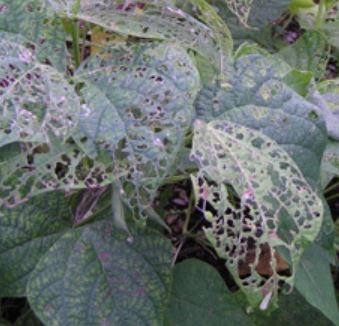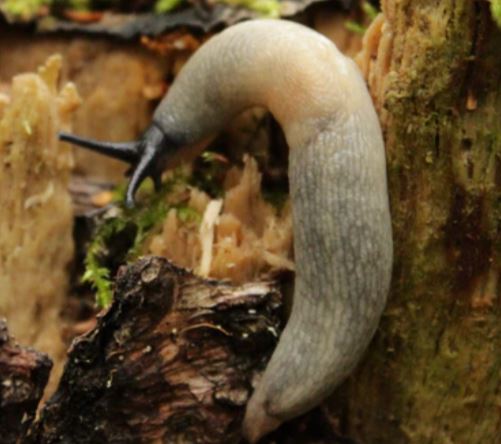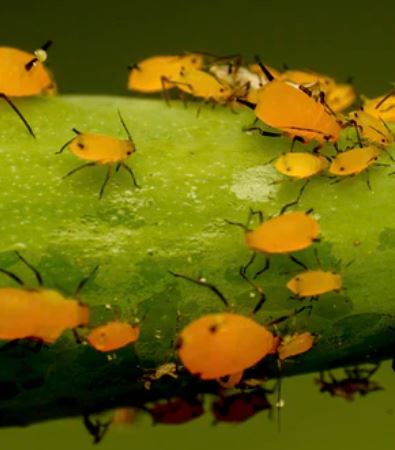Ginger is used across the USA and the world for its amazing benefits. And to economically produce ginger prevention and management of pests is a must.
Ginger pests affect the appearance, taste, and edibility of ginger. Apart from the loss of edible ginger, pests also act as a vector and transmit other diseases which can compromise the safety of your soil.
Common ginger pests
A few common ginger pests that can affect your ginger, negatively are
1. Ginger Maggots
The Ginger Maggot is a common ginger pest and is the leading cause of ginger spoilage during the storage phase.
These maggots are actually the pupae form of a moth. Throughout the year, the ginger maggots go through several generations.
Their eggs are very small (0.025 to 0.03 mm long) while the pupae are 4 to 5 mm long. These maggots appear as a pale whitish body accompanied by a blackhead.
Conditions that entice ginger maggots are dark moist storage areas with temperatures ranging anywhere from 4 to 35℃ (39 to 95℉).
How do Ginger Maggots Affect Ginger?
- Ginger is left with holes and hollowness in the rhizomes
- Rhizomes rot due to extruded secretions from the maggots
How to Control Ginger Maggots?
- Clean storage areas/warehouses before and after storing a new batch of ginger
- Select un-infected ginger rhizomes for planting
- Carefully dispose of infected ginger rhizomes before planting
Common Ginger Diseases – Effects & Symptoms | 5 Tips to manage
2. Chinese Rose Beetle

Chinese Rose Beetles are reddish-brown beetles that feed on the leaves of ginger plants.
Since they are nocturnal, they feed on the plants only at night making it more difficult to catch them in the act!
They feed vigorously on leaves, leaving just the veins and shredded outlines of what used to be a leaf.
How do Chinese Rose Beetles Affect Ginger?
- Leaves are left with a lace-like (shot-hole) appearance
- Reduced photosynthesis
- Skeleton-like plants that are weak
How to Control Chinese Rose Beetles?
- Shining bright lights for 2-3 hours after dusk on ginger plants deters feeding
- Cover young plants with covers to reduce accessibility to Chinese Rose Beetles
- Turning the soil of planted fields might destroy eggs and larvae
- Building traps as shown in the video below
3. Slugs
Another common garden pest that can negatively affect your ginger crop is slugs. Slugs are found everywhere and are mostly selective about their diet. But, in times of desperation, they can devour anything even ginger.
Slugs fall in the mollusk category and are not an insect. They are still ginger pests.
Slugs eat leaves and even mature leaf midribs and make their presence seen in the form of a shiny trail behind them. Slugs hide in soil crevices in the heat or cold and resurface for feeding at night.

How do Slugs Affect Ginger?
- Eaten leaves and rhizomes
- Plants can be stripped down completely with no chance of rhizome maturation
- Poor plant and rhizome development
How to Control Slugs?
- Pick slugs out at night or early morning (do this daily to make a noticeable difference)
- Set traps using a cup of beer or dissolved yeast to catch slugs
- Use mulch sparingly as this provides refuge for slugs
- Eliminate waste (dry leaves, boards, and rocks) under which slugs hide
- Introduce predators such as birds, toads, ground beetles, and snakes
- Scattering diatomaceous earth in your soil around ginger can dry out and kill slugs
4. Thrips
Thrips are small insects about 1 to 1.3 mm long that feed on ginger leaves among other plant species, most notably on those with bulbs, rhizomes, or tubers.
High humidity and average temperatures (23 to 28℃) are the most favorable conditions for these insects to grow and multiply.
Female thrips make minute slits in the leaf blades and lays a single egg in each slit. They are damaging to plants since both adults and nymphs constantly feed on cell sap.
With the constant loss of sap, leaves become distorted and they eventually curl or fold.
How do Thrips Affect Ginger?
- Leaves become pale due to white spots
- Severe cases result in twisting, scorching, and drying of leaves
- The overall health of ginger plants decreases
Ways to Control Thrips
- Good disposal of debris in the field can destroy adults and nymphs
- Reduce weeds as they can influence thrip populations
- Spray 50% Dichlorvos or alternatively, spray 40% Dimethoate (1ml/1L) on plants
- Natural predators (examples: Roberfly, Phytoseiid mites, pirate/flower bugs) should be introduced to control thrip numbers
5. Root-Knot Nematode
Root-Knot Nematodes are a pest that affects ginger and accounts for poor ginger output. These nematodes are parasitic roundworms that live freely in the soil, making it slightly difficult to control them.
Ginger plants affected by these nematodes show yellowing and are likely to wilt when the temperature rises. Another observation is that root-knob nematodes are mostly present in soils with a high concentration of sand.
How Root-Knob Nematodes Affect Ginger?
- Ginger plants form galls on roots (round growths)
- Wet lesions form on rhizomes
- Yellowing of leaves
- Wilting of leaves during summer
- Poor growth throughout the ginger plant
How to Control Root-Knob Nematodes?
- Reduce sand concentration in soil
- Use nematode-resistant ginger rhizomes
- Allow soil to air out and absorb as many UV rays as possible
- Check plants early for galls if symptoms point to root-knob nematodes
- Exposing ginger rhizomes to hot water (51℃/123.8℉) for 10 minutes reduces nematode occurrence
6. Black Cutworm
Black Cutworms are serious pest that affects more plants than just ginger. It chooses to affect plants at their most vulnerable stage; the seedling stage.
They are the larvae of night-flying moths. While moths do not do any harm, larvae do and eat the root and lower stems of the plants.
Leaves begin to turn to a yellow color, suggesting poor health. Eventually, these leaves die off and the plant collapses.
Black Cutworms develop into moths that have a black body and dark brown wings that measure 42 to 53 mm when spread open. Their bodies are 16 to 23 mm long making them quite visible.
Larvae are most active at night and warm and moist environments suit them.
How do Black Cutworms Affect Ginger?
- Complete destruction of the plant’s core
- Plants fell over and do not bear good-sized rhizomes
- Seedling plants do not establish into strong sturdy ginger plants
How to Control Black Cutworms?
- Weed your soil areas well to eliminate alternative hosts and hiding places
- Use a mixture of vinegar, sugar, spirits, and water, with 90% Trichlorfon to kill larvae
- Spray 90% Trichlorfon solution (1ml per 800ml water) on leaves to eliminate or reduce the larvae population
Best Soil to Grow Ginger and the Suitable Climate (Explained)
7. Aphids
Aphids are bound to be present in every garden and field and are also known to be a hassle for everyone growing economically important plant produce.
These insects are so small that their presence is usually underestimated ( in the hundreds or thousands!)
Aphids are notorious for sucking the sap out of plants. Since they occur in large numbers, the effects cannot go unnoticed for long.
Aphids are sometimes difficult to control since they quickly develop resistance to chemicals used as pesticides.

How Aphids Affect Ginger?
- Leaves become yellow
- Stunted growth leaves plants looking feeble
- Reduced rhizome size and quality
- Severe aphid infestations cause plant deformities and disfigurement
Ways to Control Aphids
- Invite natural predators into your garden or fields (ladybugs, birds, spiders, parasitoid wasps)
- Spraying daily with a high pressured water spray can keep aphids off ginger plants in your garden
- Use chemicals that are not prone to developing resistance in aphids
Tips to Limit and control Spoilage due to Ginger Pests
It is completely true that managing any pest problems begins with monitoring, observing, and then investigating.
Most often, discovering a few ginger pests on your plants can help you to treat the cause early and avoid total wreckage of your ginger crop.
1. Remove Dead Leaves and Other Matter Immediately
Dead and decaying matter usually acts as a safe place for ginger pests to hide, feed, or reproduce. Taking this away can leave ginger pests exposed and vulnerable to the natural elements and predators.
Doing this regularly can keep pests away and stop an infestation. This stops spoilage before it occurs.
2. Harbor Predatory Organisms
Birds are usually a great addition to any garden or field because they feed on worms and grubs.
Ladybugs are available for order and can be released in your garden to fend off aphid attacks.
3. Check Plants Daily
As most ginger pests are nocturnal, you should take night-time trips to your ginger plants for inspection.
You may only be lucky to discover some pests or some form of their life cycle during the daytime.
Early discovery of a small number of aphids can be warded off by spraying water on them daily or applying a new oil extract that makes leaves and stems too slippery to grip.
4. Look For Symptoms Early
Sometimes you cannot catch the pesky pests in time! You may not even know that your ginger plants are affected by a pest.
The best way to diagnose the problem is by looking at the symptoms.
5. Act Fast!
You will know something is wrong, even though you are providing your ginger plants with the best resources. The only possible reason is a pest. Therefore, there is no time to waste when suspecting a pest.
Take the best suitable approach to eliminate pests or reduce the effect on your ginger rhizomes. Overlooking pests can lead to drastic losses so be wary of the problems.


